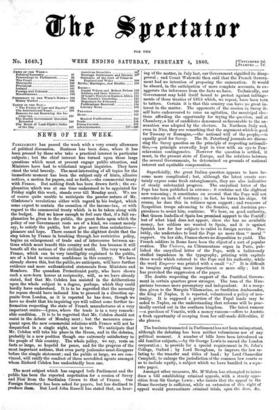The next subject which has engaged both Parliament and the
public has been the reported negotiation for a cession of Savoy and Nice from the Sardinian Crown to that of France. Our Foreign Secretary has been asked for papers, but has declined to produce them. But Lord John Russell has stated that, on hear- ing of the matter, in July last, our Government signified its disap- proval; and Count Walewski then said that the French Govern- ment had no intention of proposing the annexation. It would be absurd, in the anticipation of more complete accounts, to ex- aggerate the inferences from the facts we have. Technically, our Government may hold itself bound to protest against infringe- ments of those treaties of 1815 which, we repeat, have been torn to tatters. Certain it is that this country can have no great in- terest in the matter. The opponents of the cession in Savoy it- self have endeavoured to raise an agitation, the municipal elec- tions affording the opportunity for trying the question, and at Chambery, a list of candidates denounced as favourable to the an
was adopted by the electors. In Northern Italy and, even in Nice, they are remarking that the argument which is good for Tuscany or Romagna,—the national will of the people,—is equally good for Savoy. The St. Peterburg journals arc discus- sing the Savoy question on the principle of respecting nationali- ties —a principle avowedly kept in view with an eye to Pan- scla:vonian contingencies. However the question is settled, it must, in the present state of Europe, and the relations between the several Governments, be determined on grounds of national interest and equitable compensation.


























